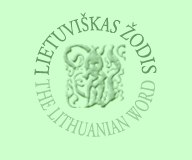Janis ENDZELINS
(1873-1961), Latvian linguist, born in Mickeni, district of Valmiera,
on Feb. 22, 1873. He studied classical philology from 1893-97 and
Baltic and Slavic languages from 1898-1900 at the University of Tartu
(Dorpat), Estonia, and remained there after these studies to prepare
himself for university teaching. In 1905 he received a master's degree
from Tartu, and in 1912 a doctor's degree from the University of St.
Petersburg. He was professor at the University of Kharkov, Russia,
from 1909-20 and at the University of Riga from 1920, with an
appointment as dean of the philology department from 1920-22. Writing
in eight different languages, he left approximately 300 scholarly
pieces on philological topics. An outstanding linguist, he was elected
a member of many foreign professional organizations, including the
Linguistic Society of America (1930). Endzelins maintained close ties
with Lithuanian linguists, exerting considerable influence on
Kazimieras Būga, with whom he kept up an active correspondence.
Endzelins made very substantial
contributions to research on his native language, Latvian. His most
important work in this area is Lettische Grammatik (1922, a
revised edition in Latvian appeared in 1951). Another monumental work,
in cooperation with K. Millenbach, is Latviešu valodas vardnica
(6 volumes, 1923-46), a dictionary of the Latvian language. The same
two authors also produced Latviešu gramatika (1907), a grammar
of Latvian designed for popular use. A noteworthy study of toponyms is
Endzelins' Latvijas vietu vardi (vol. I, 1922; vol. 2, 1925).
He also edited a scholarly collection of folksongs entitled Latviju
tautas dainas (1928-36). These and other works assured Latvian a
permanent position in Indo-European comparative linguistics and
greatly influenced the development of Standard Latvian. For 20 years
Endzelins served in various philological task-forces, devised many
neologisms and to a high degree cleansed the Latvian language from
barbarisms.
Endzelins also investigated ProtoBaltic,
the relation of Baltic languages to Slavic and Germanic tongues, and
Old Prussian and Couronian. Here his publications include Jevads
'baitu filologija (Introduction to Baltic Philology, 1945), Baltu
valodu skanas un formas (Sounds and forms of the Baltic Languages,
1948; Lithuanian translation 1957), Senprušu valoda (Germ. Altpreussische
Grammatik, Grammar of Old Prussian, 1944). In his German work Vber
die Nationalitdt und Sprache der Kuren (1912) he proved
conclusively that the Couronians were a Baltic tribe. In addition,
Endzelins devoted much attention to the Lithuanian language, reviewed
all of the more important publications dealing with it, and
contributed articles to Lithuanian philological journals.
After World War II the Soviet
administration, finding his work out of accord with Marxist
conceptions, relieved Endzelins of his teaching duties and restricted
his research to toponyms. New and expanded versions of his earlier
work on toponyms were published (vol. 1, 1956; vol. 2, 1961). He died
on July 1, 1961 in Riga.

